 Meeting once a week with your music teacher has its challenges for both parties. Time is short. Adult students often have some knowledge of the subject, they may have spent countless hours on line with YouTube, bring lofty expectations after years of enjoyable listening, and all have pressured practice times. They often feel overwhelmed and may be looking for a shortcut. Some of spent years looking for this secret. They’ve read books, magazines, attended workshops, spoke to musicians. All hoping to find a quick path to musical success. In short, they can’t see the forest for the trees. The teacher on the other hand has an extensive body of teaching and professional experience, they can see the forest for the trees. They have watched students succeed and fail. They know the student needs to slow down and go deep with a few basic concepts. Now how do we match these two parties up successfully? A good balance of questions from the student’s experience and guided exercises from the teacher says I. To make progress in piano a student must discover and experience aurally and kinetically what they are seeking. Reading alone won’t do it. Mindless adherence to the teacher’s direction and/or mechanically non-reflective practice won’t do it either. Or worse, bopping around the internet chasing one interesting video after another. Some old-school attitudes to learning a musical instrument · They believe practice is a chore they must endure. · Teacher as drill Sargent. (Like “boot camp fitness” classes) · Teacher as joy killer. (Ouch!) · Learning music is about pleasing the teacher/master. (Load up the guilt) · The teacher knows everything, I’ll just be obedient and everything will work out. (Evading responsibility) Some new-school attitudes to learning a musical instrument · Practicing is what taking lessons is all about. · Teacher as coach. (they will support and guide me on my journey) · Researching Meta cognition, the science of learning about learning. · If practicing is not fun, change it. Change the repertoire, or your attitude, or the time of day you practice, or even amend your aspirations to fit your lifestyle. · Go easy on yourself. Patience is a virtue in music study. · Seek out opportunities to experience music making at a prominent level. For example, attending concerts to hear world class performers. Cheers, David Story
0 Comments
Your comment will be posted after it is approved.
Leave a Reply. |
You've got to learn your instrument. Then, you practice, practice, practice. And then, when you finally get up there on the bandstand, forget all that and just wail. AuthorI'm a professional pianist and music educator in West Toronto Ontario. I'm also a devoted percussionist and drum teacher. Categories
All
|
 RSS Feed
RSS Feed